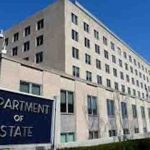Washington, Aug 13 (AFP/APP): FBI agents seized records marked “top secret” during their search of former president Donald Trump’s Florida estate, according to documents made public Friday in a probe that includes possible violations of the US Espionage Act.
The search warrant and related materials, unsealed by a Florida judge, showed agents carted away a significant number of items from the raid, which ignited a political firestorm in an already bitterly divided country.
The warrant, which was personally approved by Attorney General Merrick Garland, authorized the FBI to search the “45 office” — a reference to the 45th US president’s private office at his Mar-a-Lago residence — and storage rooms.
It directed them to seize documents and records “illegally possessed” in violation of three criminal statutes, including one falling under the Espionage Act, which makes it a crime to illegally obtain or retain national security information.
Trump, who is weighing another White House run in 2024, vehemently denounced the FBI raid on his Florida home and claimed that all of the material confiscated during the search had been previously “declassified.”
“They didn’t need to ‘seize’ anything,” he said in a statement on his Truth Social platform. “They could have had it anytime they wanted without playing politics and breaking into Mar-a-Lago.”
Legal experts cautioned that while the warrant cites the Espionage Act, any potential charges remain unclear and Trump is not necessarily suspected of espionage.
“The Espionage Act encompasses a ton of crimes that have nothing to do with ‘spying,'” Bradley Moss, a national security lawyer, said on Twitter. “It’s about unlawful storing of information relating to the national defense.”
Orin Kerr, a law professor at the University of California, Berkeley, agreed, saying the “Espionage Act is a pretty broad law about mishandling classified documents, not just espionage.”
Among the records seized during the raid were documents marked “Top Secret,” “Secret” and “Confidential.”
Some of the papers were marked “SCI” — sensitive compartmented information — meaning they were meant to be viewed only in secure government facilities.
Follow the PNI Facebook page for the latest news and updates.









